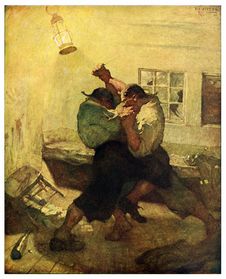By Dan Brooks
The answers you get depend on the questions you ask. The answers you seek may require questions you’ve never considered.

There is a tradition through modern Judaism that has been handed down from ancient Judaism that I find extremely valuable. It has helped me, not only in my relationship with God, but in my quest for knowledge as a whole. It is the idea that a relationship with God requires us not to accept our faith without questions or struggles, but to make peace with the struggle. The following scripture is important for a number of reasons, but this idea of struggling or wrestling with God is derived from this passage specifically:
“And Jacob was left alone; and there wrestled a man with him until the breaking of the day.
And when he saw that he prevailed not against him, he touched the hollow of his thigh; and the hollow of Jacob’s thigh was out of joint, as he wrestled with him.
And he said, Let me go, for the day breaketh. And he said, I will not let thee go, except thou bless me.
And he said unto him, What is thy name? And he said, Jacob.
And he said, Thy name shall be called no more Jacob, but Israel: for as a prince hast thou power with God and with men, and hast prevailed.
And Jacob asked him, and said, Tell me, I pray thee, thy name. And he said, Wherefore is it that thou dost ask after my name? And he blessed him there.
And Jacob called the name of the place Peniel: for I have seen God face to face, and my life is preserved.
And as he passed over Penuel the sun rose upon him, and he halted upon his thigh.
Therefore, the children of Israel eat not of the sinew which shrank, which is upon the hollow of the thigh, unto this day: because he touched the hollow of Jacob’s thigh in the sinew that shrank.” Genesis 32:24-32
In scripture Jacob literally wrestles with God. He prevails and receives a new name from The Lord. His new name, Israel, translates into English as “Struggles with God.” And the Jewish people called themselves the children of Israel. The idea that has survived in Judaism for thousands of years is that each person must struggle to come to grips with God and faith on their own terms.
In this tradition nothing, not scripture, not the words of the Prophets, are to be taken as true without that struggle to understand. Because a teacher, Prophet, Bishop, or a Parent can tell you the answer, but they can’t understand it for you. Which is why you must wrestle until the day breaks and you do understand, until you can see the light for yourself the struggle is not over for you.
When Jesus taught, he was fond of using parables to make his point. He may have quoted scripture, but his most profound points were made through parables. I think it may be because with a parable the lesson is caught rather than memorized and repeated. Jesus takes us on a journey with him in each parable, so that we arrive at the end with him. He is not simply asking us to repeat what we have heard.
It’s like when my math teacher would have me show my math on a test. Having the right answer was half of the earned point, showing my math was worth the other half. I lost points if my math did not add up, even if the answer was correct. When Jesus taught using parables, he is showing us his math and leaving us to follow him toward the answer. In math there’s usually one answer. But in those parables, there are many. They deepened the lesson rather than obscuring it or muddying it. At least for me.
Wisdom can only be earned, not memorized and repeated. It requires wrestling with the subject you wish to understand. What strikes you as wise may not connect in the same way for others.
It’s like medication. If you take a medication I am on, you may have side effects I do not, and vice versa. Or, it may not be effective for you, whereas it may work wonders for me. You should not take my medicine, because it is for me. You may require something different. The fruit borne from my struggle with God may not be what you need.
Another way of looking at it is to think of people who read Shakespeare. Shakespeare is lofty and beautiful to read, but Shakespeare wrote plays not novels. It would be like reading scripts to Spielberg movies. It’s not without reward, but those scripts are meant to be watched every bit as much as plays are meant to be watched rather than read.
Another example is how my teenager spends hours watching people on youtube play minecraft. The game is meant to be played, not watched like a movie. And these questions that arise in each parable, and the rest of scripture for that matter, are meant to be wrestled with. They are meant to be challenged, because they were intended to challenge each of us.
Life in broad terms is a continual struggle. A life spent walking with God requires struggle, too. It may take more than one night in the desert. It is a lifelong process. In the same way that EMT’s and CNA’s
require continuing education to maintain their licenses, we may require another night wrestling with The Lord to maintain our life with him and our walk with him.
I’ll give an example of my struggle with God. The most basic question I had growing up was “How does an omnipotent and benevolent God allow for evil and suffering in the world to exist?”
(I’m just using this to show you how the process worked for me rather than push my answer on you.)
I wrestled with this question for months. I read a lot trying to find a good answer. I read about evil people and events to see how they happened. None of what I read truly soothed this burning question. I prayed, begged, and pleaded for an answer, but I received only silence. Then, one day, I was playing Chess with my Dad when he made a move I didn’t understand, as it was something I’d never seen him do. It stood out because playing him is like playing a computer; he makes the same exact opening moves and is usually predictable.
He told me that it was a legal move and he didn’t make the rules, that he only abided by them.
Then I thought “What if that’s it? Evil and righteousness is like Chess. God made the board, the pieces, and the rules, but we are responsible for how we play, not him?” The further thought occurred to me that you can only have righteousness if you have free will. Without choice there can be no virtue. But without choice there can be no evil either. Jesus wanted us to have a choice, Satan demanded we should not.
It’s not the perfect explanation. It invites plenty more questions needing answers, but it felt right to me. It soothed the burning question I had to begin with. It took months of study, prayer, and wrestling with God to understand. But, would I have realized this without the wrestling, the prep work? If I had read this explanation during that time would it have clicked in the same way that it did when I realized this on my own? I am certain it would not have had the same benefit. Had I simply read or been told the answer, I feel strongly that the process is as integral as the answer(s) I arrived at.
I think of it like growing your own food. I had a small garden box with various plants for salads, sandwiches, pies, and other foods. My wife took some of those ingredients to make us fresh sandwiches one afternoon, and they were the best sandwiches I ever had. The result of our work was satisfying in a way that store bought food never has been. It’s not nearly as rewarding, good for your health, or good for your spirit as doing the work yourself. Trying to memorize wisdom without earning it is a bit like knowing the price of everything, but the value of nothing.
Temporarily
